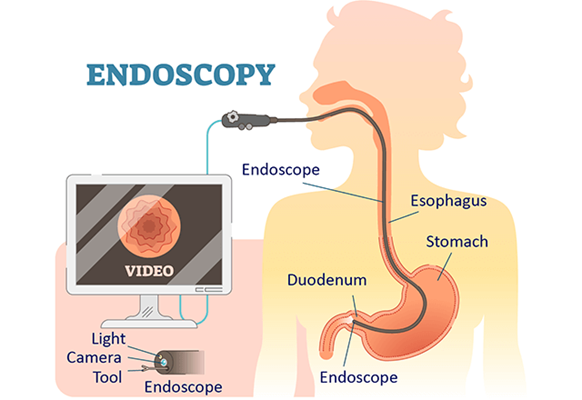Endoscopy is the use of a flexible tube with a camera and light source, known as an endoscope, to see within organs and tissues. This minimally invasive method allows clinicians to evaluate regions such as the gastrointestinal (GI) tract, respiratory system, urinary tract, and reproductive systems without requiring surgery. Endoscopy, by delivering real-time pictures, allows for better diagnosis and tailored therapy, frequently resulting in faster recovery periods and fewer problems.
The Role of an Endoscopy Expert
Endoscopy experts play a crucial role in the healthcare landscape, offering specialized skills and advanced techniques to address a wide range of medical conditions. Their comprehensive training and experience equip them to perform various types of endoscopic procedures with precision and proficiency, ensuring optimal outcomes for patients.
Diagnoses and Treatments
1. Gastrointestinal Disorders:
- Gastroesophageal Reflux Disease (GERD): Endoscopy helps identify esophageal inflammation, ulcers, or strictures caused by GERD, guiding appropriate treatment strategies.
- Peptic Ulcers: Endoscopic examination allows for direct visualization of ulcers in the stomach or duodenum, facilitating targeted therapy to promote healing and prevent complications.
- Colon Polyps and Cancer: Screening colonoscopy performed by an endoscopy expert enables the detection and removal of precancerous polyps, reducing the risk of colorectal cancer.
2. Respiratory Conditions:
- Chronic Obstructive Pulmonary Disease (COPD): Bronchoscopy, a type of endoscopic procedure, aids in evaluating airway abnormalities and collecting samples for biopsy in patients with COPD.
- Lung Cancer: Endobronchial ultrasound (EBUS) allows for precise imaging of mediastinal lymph nodes, aiding in the staging and treatment planning for lung cancer patients.
3. Urological Disorders:
- Kidney Stones: Ureteroscopy, performed by a skilled endoscopy specialist, enables the visualization and fragmentation of kidney stones, facilitating their removal and relieving associated symptoms.
- Bladder Cancer: Cystoscopy provides direct visualization of the bladder lining, allowing for the detection and biopsy of suspicious lesions indicative of bladder cancer.
4. Gynecological Issues:
- Endometriosis: Laparoscopy, a minimally invasive endoscopic procedure, allows for the visualization and excision of endometrial implants in women with endometriosis, alleviating pain and improving fertility.
- Fibroids: Hysteroscopy enables the evaluation and removal of uterine fibroids, offering symptomatic relief and preserving fertility in select cases.
Seeking Quality Care
Individuals seeking diagnostic clarity and individualized therapy for a variety of medical issues may benefit from visiting with an endoscopy expert in Udaipur. These professionals combine clinical competence with a patient-centered approach, ensuring that each person receives individualized treatment and support throughout their healthcare journey.
Conclusion
Endoscopy experts, such as Dr. Shraddha Sharma, can diagnose and treat a wide range of ailments and disorders. Her experience ranges from gastrointestinal problems and cancer detection to endoscopic surgery and treatments, allowing her to provide patients with cutting-edge care that is both precise and compassionate. As we continue to uncover the mysteries of the human body, endoscopy remains an essential instrument in the hands of competent doctors like Dr. Sharma, paving the path for improved health and brighter futures.





Comments